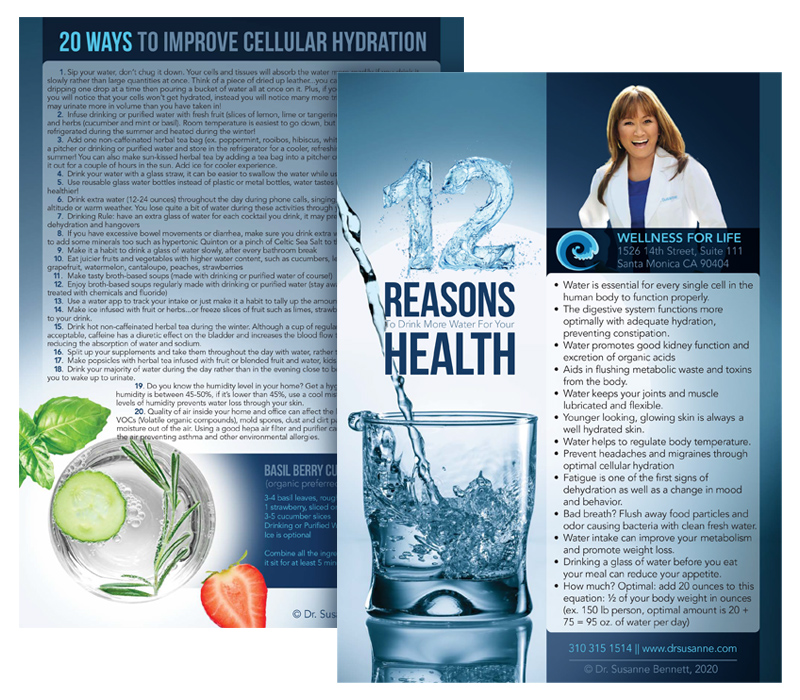Every organism on the planet needs water to regulate its every function — especially human beings. Keep in mind that every breath, thought, sensation, and muscle twitch relies on millions of tiny processes happening at a microscopic level. Let’s look at the major ways water works within our own bodies.
Heat Regulation
Critical to every biological process is heat regulation. Energy expenditure puts out heat, and our bodies need a cooling mechanism to keep that heat in check. Because water requires a very particular level of heat to raise its temperature, it’s able to absorb a significant amount of excess heat that would otherwise cause enzymes to burn out and cease to properly function.
Your body cools itself by sweating. So of course the water that leaves your body when you sweat needs to be replaced. Drinking water throughout the day revives the body by allowing it to maintain its natural cooling process and by preventing dehydration — particularly important during the summer time when people are more prone to heat exhaustion and stroke.
Universal Solvent
Water is made out of two hydrogen atoms, and one oxygen atom. This chemical bond draws both positive and negative ions, so when water mixes with other substances, positive ions move toward the water’s oxygen atom, while negative ions move toward the hydrogen atoms. This setup allows water to break down a variety of compounds. Within our bodies, water dissolves many of the chemical material we need to survive — like the glucose in the food we eat. That content can then be moved throughout the body via our bloodstream and catalyzes all the crucial reactions our body executes to stay alive.
Metabolism
Take all the chemical reactions that go on inside of an organism — we refer to that summation as metabolism. Water is the chemical that contributes to these reactions and fuels ALL the processes that keep plants and animals alive from moment to moment.
In plants, water facilitates photosynthesis, the process plants use to turn sunlight into food. In animals, water facilitates respiration. Respiration brings oxygen into our cells which is then used to make ATP. ATP gets divided into ADP and phosphoric acid. This division releases the cellular energy that powers every reaction, and removes waste molecules from the body after the respiration cycle has finished.
This metabolic cycle is part of the process that naturally removes the build-up of toxins within our bodies — toxins that typically come in the form of cellular waste.
Detoxification
The pile-up of cellular waste throughout the body de-optimizes the lifecycle of our cells. Cells rely on water to turn over regularly and efficiently, and to provide for the healing, growth, and recovery we need to live our best lives.
We can’t build muscle, lose fat, gain flexibility, or improve our skin if cellular waste weighs down our metabolism and slows the process. This is why many sports physiologists actually suggest drinking plain water rather than sports drinks that tout an abundance of electrolytes. Because electrolytes comprise much of our typical diet anyway, and we ingest these salt ions via vegetables and other nutrient-dense foods, it makes more sense to workout with pure water that can dilute and flush out the cellular waste our bodies need to remove.
The process of anaerobic respiration breaks down sugars and results in waste like:
- Carbon dioxide
- Nitrite
- Succinate
- Sulfide
- Methane
- Acetate
Water helps to eliminate all of this.
Inner Environment
Through our bloodstream, water also acts as the insulation and conduit that delivers energy to all regions of our body, and keeps every organ system in operation. The unique ecology of our gut bacteria requires a continual supply of adequate water to break down and synthesize the nutrients we consume. And all of it must be sorted and allotted for use in energy, growth, maintenance, and healing.
Picture the complicated job of our digestive, urinary, and circulatory systems. These systems are tasked with breaking down every substance that enters our body, using it as energy, delivering it where it’s needed, and then expelling it as waste. How could our bodies achieve this without water as a processing agent?
Water makes way for every bodily operation by clearing space for new cells and diluting the debris that needs to be flushed out in sweat or urine. Traces of heavy metals, for example, sometimes get stored in fat and must be cleared out to improve our functioning. This process of diluting and flushing works toward the health of every system — including the lymphatic system. Metabolic waste molecules impair our immunity when they build up to clog the lymphatic system and create a honey-like consistency that needs to be more fluid.
Weight Loss
If you’re attempting to lose a few pounds, water intake is crucial. Water helps you suppress your appetite and metabolizes the fat you want to be breathed out and excreted a little at a time. If your kidneys aren’t operating with the correct amount of water, the liver steps up to do the job of eliminating toxins. The downside of this? If the liver is needed to fulfill the role of the kidneys, it’s not converting your fat into energy. Instead, your fat stays in place and continues to store itself.
Any aerobic or weight training program designed to shed body fat must be accompanied by plentiful water intake to maximize your success. When your system is working harder than its use to, you have to give it every advantage.
Disease Prevention
Because of water’s role in these many crucial processes, every doctor advocates property hydration as a defense against:
- Chronic joint diseases
- Rheumatoid arthritis
- Inflammation
- Poor cartilage health
- The visible signs of aging
- Constipation
- Diabetes
- Hypoglycemia
- Obesity
- Arthritis
- Kidney stones
- Dry skin
- Wrinkles
- Cataracts
- Glaucoma
You can see why water is such a critical component of our makeup, as it leads all of the biological interplay that allows us to exist. Just as the earth is an ecosystem reliant on water for its many cycles and dynamics, the human body is also its own complete ecosystem, and the right choices keep it healthy!
In upcoming blogs, we will discuss the different kinds of drinking water on the market, and which provide the most benefit for our daily functioning and extended longevity. Stay tuned! I’ve got more valuable tips and techniques right around the corner!
Click here to watch a short intro video to kick off the water series!




